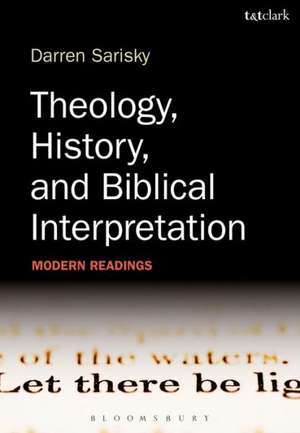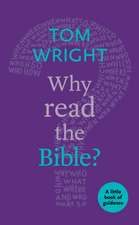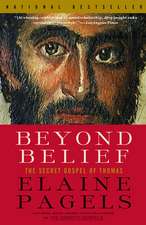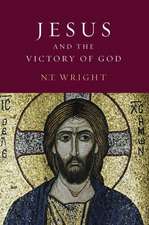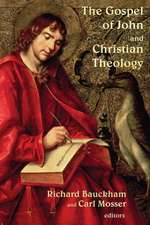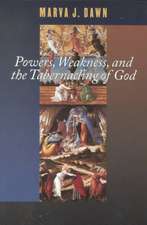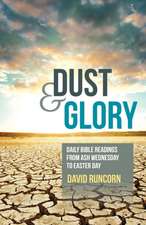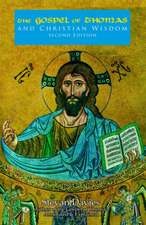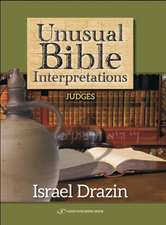Theology, History, and Biblical Interpretation: Modern Readings
Autor Dr Darren Sariskyen Limba Engleză Paperback – 28 ian 2015
Preț: 322.28 lei
Preț vechi: 366.61 lei
-12% Nou
Puncte Express: 483
Preț estimativ în valută:
61.69€ • 67.03$ • 51.85£
61.69€ • 67.03$ • 51.85£
Carte tipărită la comandă
Livrare economică 21 aprilie-05 mai
Preluare comenzi: 021 569.72.76
Specificații
ISBN-13: 9780567459800
ISBN-10: 0567459802
Pagini: 504
Dimensiuni: 169 x 244 x 30 mm
Greutate: 0.86 kg
Editura: Bloomsbury Publishing
Colecția T&T Clark
Locul publicării:London, United Kingdom
ISBN-10: 0567459802
Pagini: 504
Dimensiuni: 169 x 244 x 30 mm
Greutate: 0.86 kg
Editura: Bloomsbury Publishing
Colecția T&T Clark
Locul publicării:London, United Kingdom
Caracteristici
Discusses
the
strengths
and
weaknesses
of
each
approach
and
considers
whether
they
are
finally
reconcilable
Notă biografică
Darren
Sariskyreceived
his
PhD
from
the
University
of
Aberdeen,
UK.
From
2009-2013,
he
was
a
Teaching
Associate
and
then
a
Junior
Research
Fellow
at
the
University
of
Cambridge,
UK.
He
is
now
a
Lecturer
in
Systematic
Theology
at
King's
College
London,
UK.
Cuprins
Copyright
Acknowledgments
viiIntroduction:
Theology,
History,
and
Biblical
Interpretation
11
Spinoza,
Benedict
de.
Theological-Political
Treatise.
Cambridge:
Cambridge
University
Press,
2007.
Chapter
7,
"On
the
Interpretation
of
Scripture."
112
Strauss,
David
F.
The
Life
of
Jesus
Critically
Examined.
London:
SCM,
1973.
Selections
from
Introduction,
"Development
of
the
Mythical
Point
of
View
in
Relation
to
the
Gospel
Histories."
293
Kierkegaard,
Søren.
Concluding
Unscientific
Postscript
to
Philosophical
Fragments.
Vol.
1.
Princeton:
Princeton
University
Press,
1992.
Chapter
1,
"The
Historical
Point
of
View."
694
Troeltsch,
Ernst.
"On
the
Historical
and
Dogmatic
Methods
in
Theology."
In
Religion
in
History,
11-32.
Edinburgh:
T&T
Clark,
1991.
895
Barth,
Karl.
The
Epistle
to
the
Romans.
Oxford:
Oxford
University
Press,
1968.
Prefaces
1-6.
1096
Bultmann,
Rudolf.
"The
New
Testament
and
Mythology."
In
The
New
Testament
and
Mythology
and
Other
Basic
Writings,
edited
by
Schubert
Ogden,
1-44.
Philadelphia:
Fortress,
1984.
1317
Pope
Pius
XII.
Divino
Afflante
Spiritu:
On
Promoting
Biblical
Studies.
Rome,
1943.
1658
Ebeling,
Gerhard.
Selections
from
"The
Significance
of
the
Critical
Historical
Method
for
Church
and
Theology
in
Protestantism."
In
Word
and
Faith,
17-61.
London:
SCM
Press,
1963.
1879
Lubac,
Henri
de.
History
and
Spirit:
The
Understanding
of
Scripture
According
to
Origen.
San
Francisco:
Ignatius,
2007.
Selections
from
the
Conclusion.
219
10
Stendahl,
Krister.
Selections
from
"Biblical
Theology,
Contemporary."
In
The
Interpreter's
Dictionary
of
the
Bible,
edited
by
George
A.
Buttrick.
New
York:
Abingdon,
1962.
23911
Childs,
Brevard
S.
Introduction
to
the
Old
Testament
as
Scripture.
Philadelphia:
Fortress
Press,
1979.
Chapter
3,
"Canon
and
Criticism."
25512
Steinmetz,
David
C.
"The
Superiority
of
Pre-Critical
Exegesis."
Theology
Today
37
(1978):
27-38.
26713
Luz,
Ulrich.
"Reflections
on
the
Appropriate
Interpretation
of
New
Testament
Texts."
In
Studies
in
Matthew,
265-289.
Grand
Rapids:
Eerdmans,
2005.
27914
Marion,
Jean-Luc.
God
without
Being:
Hors-Texte.
Chicago:
University
of
Chicago
Press,
1991.
Chapter
5,
"Of
the
Eucharistic
Site
of
Theology."
30315
Schüssler
Fiorenza,
Elisabeth.
"The
Ethics
of
Biblical
Interpretation:
Decentering
Biblical
Scholarship."
Journal
of
Biblical
Literature
107
(1988):
3-17.
32116
Levenson,
Jon
D.
"The
Hebrew
Bible,
the
Old
Testament,
and
Historical
Criticism."
In
The
Hebrew
Bible,
the
Old
Testament,
and
Historical
Criticism:
Jews
and
Christians
in
Biblical
Studies,
1-32.
Louisville:
Westminster/John
Knox,
1993.
33717
Plantinga,
Alvin.
"Two
(or
More)
Kinds
of
Scripture
Scholarship."
Modern
Theology
14
(1998):
243-278.
36518
Ricour,
Paul.
"The
Nuptial
Metaphor."
In
Thinking
Biblically:
Exegetical
and
Hermeneutical
Studies,
edited
by
André
LaCocque
and
Paul
Ricour,
265-303.
Chicago:
University
of
Chicago
Press,
1998.
40319
Barr,
James.
The
Concept
of
Biblical
Theology:
An
Old
Testament
Perspective.
Minneapolis:
Fortress,
1999.
Chapter
12,
"Evaluation,
Commitment,
Objectivity."
43920
Webster,
John.
Holy
Scripture:
A
Dogmatic
Sketch.
Cambridge:
Cambridge
University
Press,
2003.
Chapter
1,
"Revelation,
Sanctification,
and
Inspiration."
459Index
485
Recenzii
These
extensive
readings
provide
a
wonderful
resource
for
engaging
biblical
hermeneutics.
Darren
Sarisky's
introductions
are
clear
and
concise,
gently
helping
the
reader
to
keep
central
questions
in
mind.
Whatever
one's
inevitable
quibbles
over
a
text
getting
left
out,
these
selections
represent
important
moments
of
the
modern
conversation
about
theology
and
interpretation.
Sarisky
is
one
of
the
young
scholars
who
can
advance
that
conversation
to
a
new
stage,
and
here
he
does
so
by
helping
us
attend
to
its
historical
context.
Theology, History and Biblical Interpretationis a collection of twenty seminal essays that, taken together, reflect the ebb and flow of historical vs. theological interests over the past two hundred years of biblical interpretation. Darren Sarisky provides a helpful editorial introduction and offers a broader perspective from which to see present-day controversies for what they are, namely, the latest chapter in the long story of the Bible, history, and theology in the modern world. This is a helpful collection of essays that convincingly demonstrates the importance of coming to grips with the meaning and relationship of historical and theological biblical interpretation.
Darren Sarisky's well-chosen and diverse collection of readings in the modern history of biblical interpretation shows that this is not the case. Biblical interpreters have engaged intensively with the history/theology problem for over three centuries, and Sarisky has done students and their teachers a great service by making such a broad range of major contributions to this debate available within a single volume
Since the Enlightenment, thoughtful readers of the Jewish and Christian Bibles have asked whether and how ancient scriptural texts, for all their historical particularity, might be or become the divine word. In this judicious selection of key voices in this debate, Darren Sarisky ushers the reader into this lively and ongoing conversation. The masters are all here, from Spinoza and Kierkegaard to Troeltsch and Ricoeur. Careful attention to these readings might save historical criticism from its thoughtless historicism, and theological interpretation from its ahistorical weightlessness, and resource a sophisticated dialogue between history and theology in the reading of the Bible today.
Theology, History and Biblical Interpretationis a collection of twenty seminal essays that, taken together, reflect the ebb and flow of historical vs. theological interests over the past two hundred years of biblical interpretation. Darren Sarisky provides a helpful editorial introduction and offers a broader perspective from which to see present-day controversies for what they are, namely, the latest chapter in the long story of the Bible, history, and theology in the modern world. This is a helpful collection of essays that convincingly demonstrates the importance of coming to grips with the meaning and relationship of historical and theological biblical interpretation.
Darren Sarisky's well-chosen and diverse collection of readings in the modern history of biblical interpretation shows that this is not the case. Biblical interpreters have engaged intensively with the history/theology problem for over three centuries, and Sarisky has done students and their teachers a great service by making such a broad range of major contributions to this debate available within a single volume
Since the Enlightenment, thoughtful readers of the Jewish and Christian Bibles have asked whether and how ancient scriptural texts, for all their historical particularity, might be or become the divine word. In this judicious selection of key voices in this debate, Darren Sarisky ushers the reader into this lively and ongoing conversation. The masters are all here, from Spinoza and Kierkegaard to Troeltsch and Ricoeur. Careful attention to these readings might save historical criticism from its thoughtless historicism, and theological interpretation from its ahistorical weightlessness, and resource a sophisticated dialogue between history and theology in the reading of the Bible today.
